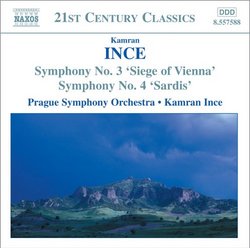| All Artists: Kamran Ince, Prague Symphony Orchestra Title: Ince: Symphony No. 3 'Siege of Vienna'; Symphony No. 4 'Sardis' Members Wishing: 0 Total Copies: 0 Label: Naxos Original Release Date: 1/1/2005 Re-Release Date: 6/21/2005 Genre: Classical Style: Symphonies Number of Discs: 1 SwapaCD Credits: 1 UPC: 747313258826 |
Search - Kamran Ince, Prague Symphony Orchestra :: Ince: Symphony No. 3 'Siege of Vienna'; Symphony No. 4 'Sardis'
 | Kamran Ince, Prague Symphony Orchestra Ince: Symphony No. 3 'Siege of Vienna'; Symphony No. 4 'Sardis' Genre: Classical
|
Larger Image |
CD Details |
CD ReviewsWonderful modern symphonies - lovers of Prokofiev, Gorecki, Karim Elmahmoudi | San Francisco, CA USA | 07/04/2005 (4 out of 5 stars) "I really enjoyed this music - exotic rhythms and sometimes turbulent harmonies blended with European and Eastern color. To me, Ince's musical language sounds like a mix between Prokofiev, Shostakovich, Gorecki, and Nyman. The recording is a bit heavy on the percussion and brass and less so on the strings, but it is otherwise well engineered. Don't expect a sonata allegro form to these symphonies. They are more like programmatic episodes but the over all impression is of a creative composer with a talent for programmatic musical expressions. I look forward to hearing other music by this composer." Colorful Music with Exotic Near Eastern Flavor J Scott Morrison | Middlebury VT, USA | 07/21/2005 (4 out of 5 stars) "I'm not sure why Turkish-American composer Kamran Ince (b. 1960) called the two large pieces here symphonies. They strike me more as tone poems or even as music for an imaginary movie. But whatever these pieces are, they are effective in establishing mental pictures of a scenario, described in some detail in the illuminating notes by eminent musicologist (and fellow Turk) Ates Orga. The Symphony No. 3 'Siege of Vienna' (1994-1995) describes in music the two unsuccessful attempts by the Ottomans to besiege and conquer Vienna as part of their campaign to make inroads into the European continent. The score calls for immense forces, including, among other instruments, a huge percussion battery, an electric bass, a synthesizer and a quartet of Wagner tubas. Depictions of cannon fire, Turkish military music (familiar to westerners from the Janissary music of such composers as Mozart), as well as middle eastern cantillation. In the section labeled 'Victorious City' one hears keening melancholy Turkish melodies as the Turks begin their retreat. All this is played (in excellent sound) with effectiveness by the Prague Symphony Orchestra under the composer. Symphony No. 4 'Sardis' (1999-2000) was commissioned by the director of excavations at the site of the ancient city of Sardis, roughly sixty miles east of modern Izmir (Smyrna), Turkey. An important crossroads, Sardis was conquered by the Persians and later by Alexander the Great, before being taken over by the Turks in the eleventh century. The symphony is in five sections that depict I. Hermus River, II. Necropol, III. Acropol, IV. Thousand Hills, and V. Tmolus Mountain, all located in or near the eponymous city of Sardis. Although some of the sections of this work feature the same kind of percussion-heavy sound heard in 'Siege of Vienna' there is much more in the nature of landscape painting, particularly lovely in the flowing 'Hermus River' and the mocking of human vanity in the 'Thousand Hills' sections. 'Tmolus Mountain' depicts a site sacred to Sardis's goddess, Cybele. It is located in a craggy mountainous area. An oboe depicts the sacred meaning of the site and stabbing tutti chords limn the all but impenetrable rocky landscape. The shortest work here is 'Domes.' An entirely winning nocturne that rarely rises above a mezzo forte, it is richly orchestrated, has gorgeous melodies, and conveys a kind of obsessiveness, according to the composer, representative of the Whirling Sufi Dervishes. Ince is a composer to investigate. He primarily writes instrumental music and if these three pieces are any indication, he combines real melodic skill and formal craft with fabulous abilities as an orchestrator. Scott Morrison" Not top drawer.. Thomas Martin | USA | 08/22/2007 (4 out of 5 stars) "Although beautifully orchestrated and performed, these pieces seem to be nothing more than a continuation of his astounding "Fall of Constantinople" - one of my desert island CDs. If you don't know Ince's work, start with that work and explore this one later if you like what you hear."
|

 Track Listings (14) - Disc #1
Track Listings (14) - Disc #1